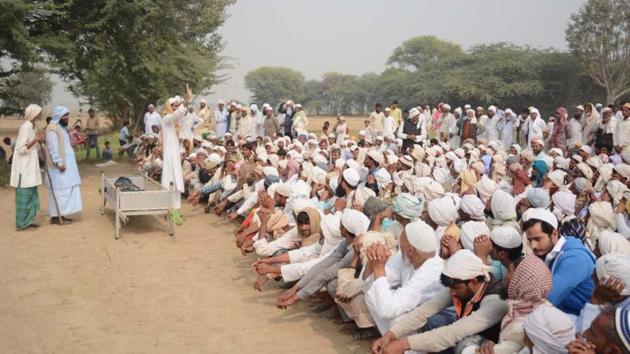A birth and a death, life’s cruel twist plays out in slain cattle trader Umar’s house
Cattle trader Umar Mohammed’s body was found on the railways tracks in Alwar last week. His family has claimed that cow vigilantes murdered him.
As Umar Mohammed’s body was wheeled in for autopsy, his distraught and emaciated wife walked into the labour room for their ninth child. The dead father and the newborn reached home the same day.

The 38-year-old Khursheeda gave birth to a boy on Wednesday afternoon at a community health centre (CHC) in Pahadi, about 10km from their village — Ghatmika in Rajasthan’s Bharatpur.
A thatched room without doors and a plot of open space, where the family keeps its buffalo and three goats, constitutes their home. Umar’s wife lies in a straw shack covered with a tarpaulin. The reddish newborn lies beside her.
The child wails for comfort, but his voice fails to pierce the gloom surrounding the village dotted with bare brick houses, cattle and chicken crisscrossing rustic roads, and a woody smoke in the air.
His 42-year-old father was shot dead by assailants in Alwar in early on November 10 when he was transporting cows to his village.
Umar’s body was found on railway tracks in Alwar’s Ramgarh on Friday evening and sent to Jaipur by police ahead of the chief minister’s visit to the area. The autopsy was delayed till Wednesday because of objections from the family.
Hundreds of people gathered in Ghatmika, mostly from villages in the Muslim-dominated Mewat region, on Thursday. Bearded men, turbans over weather-hardened faces, and clad in mud-stained white. The women wore chadors around their faces and clenched with teeth to keep them in place.
As the baby slept in the shack, the imam began his sermon at Umar’s funeral.
“Umar is going from this world with empty hands. This is how all of us will go,” he said.
The imam named the newborn Ibran Khan. He’s the first to be named by somebody other than his father.
Before the burial, a public meeting was held to decide whether to bury the body or stage an indefinite protest at the collectorate.
Zareena, Umar’s elder sister who took her sister-in-law to the hospital, said the delivery was difficult. “Somebody forces some water or tea down her throat once in a while and that’s all she’s taken in the past six days. Ajeeb murdayi chhayi hui hai us pe (a strange sadness engulfs her),” she said, sitting on a cot next to her frail and teary-eyed mother.
Sitting on his haunches near Zareena is Maqsood, Umar’s eldest son, with an amulet around his neck and hennaed toenails on his dust-caked feet matching the colour of his red slippers.
The 18-year-old betrays ignorance about the craft of making a living.
“He was killed in a way that even the cruel would pity,” said Fazluddin, a relative from Nuh, another district in the Mewat region. Umar had gone to buy cows so that he could have milk for the newborn, he added.
But police suspect Umar and his friends were cow smugglers and what happened on the morning of November 10 was a clash between two criminal groups. There is one case of cattle smuggling against Umar and three against Tahir Khan, his friend, Alwar police said in a press note.
“The police are lying. The supposed case against Umar is actually against another guy named Umaruddin. The name of the suspect’s father is also different,” says Shifat Ahmed, a retired bank manager, who was at the funeral meeting.
Umar’s relatives accuse cow protection vigilantes of murder and alleged that police were hand in glove with them.
Another dairy farmer, Pehlu Khan, was killed by the vigilantes in Alwar in April this year. The so-called cow protectors have targeted cattle and meat traders, transporters and even farmers walking their animals.





